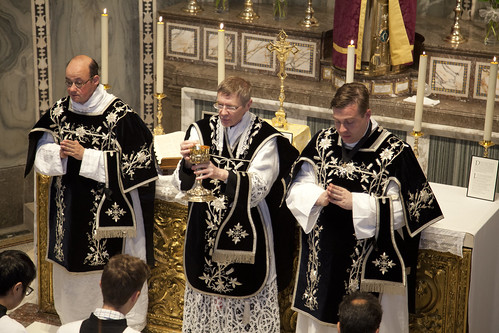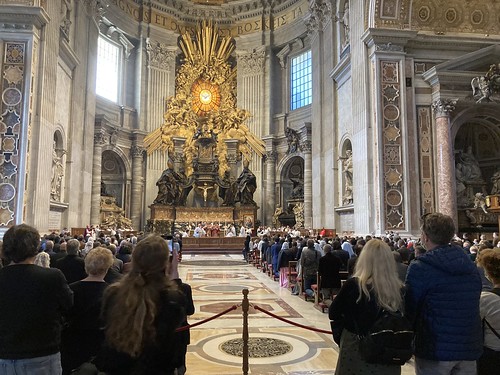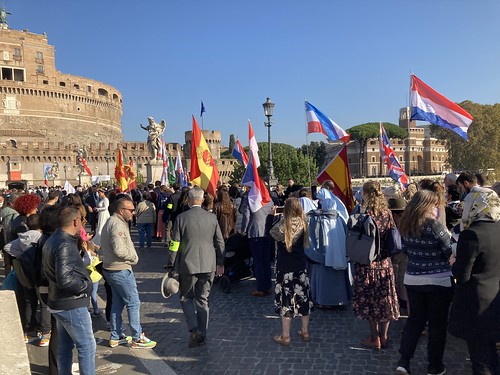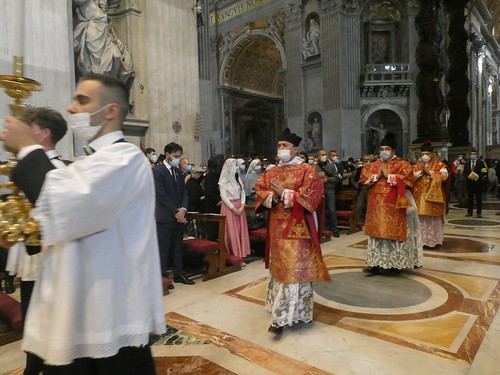Chairman's Blog
Response to Cardinal Cupich
 |
| LMS Pilgrimage to Bedford (in reparation for abortion), to the Shrine of Our Lady of Guadalupe |
Cardinal Cupich has published a defence of Traditionis Custodes in the Jesuit magazine America. (An earlier article, on Pray Tell, finds a response from Matthew Hazell on Rorate Caeli here.) In this article he argues... well it is actually quite unclear what he is arguing.
Is he suggesting the TC was a response to the failure of the SSPX to submit to the Holy See after Summorum Pontificum? In which case why are their privileges to give absolution and witness marriages in the old Rite not the target of the Holy See's restrictions, instead of the corresponding rights now denied to priests in good standing in the diocese of Rome?
Is he suggesting, instead, that the problem has been that people have been "promoting" the "antecedent liturgies"? But isn't that exactly what Pope Benedict XVI called for when saying that "it behooves us to ...to give them their proper place"?
Or is he arguing something quite different: that the very existence of an alternative form of the liturgy is a wound in the unity of the Church? In which case his complaint is less against the SSPX, or the Faithful who attend the Usus Antiquior under the bishops, but with Pope Benedict himself.
I have published a response in Catholic World Report. (America declined to let me respond.)
Cardinal Cupich begins the story with Archbishop Marcel Lefebvre, in “the early 1970s”. It is worth noting that by the time the SSPX became headline news, with its canonical suppression in 1975 and unauthorised ordinations in 1976, lay groups had been campaigning for the ancient Mass for more than a decade, and had achieved a symbolic, if limited, concession in Pope Paul VI’s Indult for England and Wales which was signed in November 1971, exactly fifty years ago. It was, similarly, the desire of the Faithful, not of SSPX clergy, which was recognised by Pope John Paul II’s world-wide indult of 1984, which does not mention the SSPX, and these Faithful who are again noted as a motivation for Pope Benedict’s Apostolic Letter Summorum Pontificum.
This is worth emphasizing because, although they share an attachment to the former Missal, the International Una Voce Federation (founded in 1965) and its member associations around the world, and the SSPX, are clearly distinct phenomena, and have suffered quite different fates in recent years. In 2016 Pope Francis gave priests of the SSPX special faculties to hear confessions, and in 2017 he made provision for them to officiate at marriage services. They still enjoy these privileges today. Priests serving the faithful within the structures of the Church, on the other hand, have just been forbidden to do either thing using the older books used by the SSPX in the very diocese of Rome. If Traditionis Custodes is motivated by disappointed hopes for “healing and unity” with the SSPX, it seems to have sadly mistaken its target.
Iota Unum series continues: Dominic Sullivan, 19th November
The Iota Unum talks in London have triumphantly returned, and we are continue the series this Friday in the basement of Our Lady of the Assumption, Warwick Street. Doors open at 6:30 for the talk at 7pm; refreshments provided; £5 on the door.
Please come into the parish room via the stairs from Golden Square, rather than through the church. So the address is that the of the Presbytery: 24 Golden Square, London W1F 9JR
This month Dominic Sullivan, Head of Classics at the London Oratory School, is giving a talk entitled 'Spanish Intergrism and the Lesser Evil'.
Remembering the Agatha Christie Petition
 |
| High Mass in the Chapel of the Throne, St Peters, for the Summorum Pontificum Pilgrimage 2021. The celebrant was Mgr Patrick Descourtieux. Photo by Edward Pentin |
My latest in the Voice of the Family bulletin. Here I address the objection that the beauty of the liturgy and the music and so on are irrelevant to the real value of the liturgy.
------------------------
Almost exactly fifty years ago, 5th November 1971, the reformer of the Catholic liturgy, Archbishop Annibale Bugnini, wrote to John Cardinal Heenan, informing him of the terms of an “indult”, permission, for the continued public celebration of the older Catholic liturgy, the Traditional Latin Mass, with the agreement of the local bishop. The reformed Mass had been in place for less than a year, and Catholics had been warned that the older Missal would become illicit at the end of the calendar year, except for private celebrations by older priests. Although the indult was applicable only to England and Wales, Bugnini was denied the complete victory of the reform he had wanted to see. In 1984 another indult for the Old Mass was signed, by Pope John Paul II, which extended permission for the Vetus Ordo to the whole world.
Paul VI believed that the reformed Mass was theologically accurate and rich, and he had high hopes that it would be pastorally effective. One argument which retained the power to move him was historical and cultural. Pope Paul had indeed indicated that he understood such arguments, speaking of the “expressive sacrality” of Latin and the “regret” which faithful Catholics might feel in the change. Heenan, who had attended the canonisation of the Forty Martyrs just days before his meeting with the Pope – forty men and women who had literally died for the Mass – was able to show Pope Paul a petition showing an astounding number of figures of the highest culture begging him to preserve something which, as the petition text expressed it, “belongs to universal culture”.
Vicar General of Rome attempts to ban the use of the 1962 Rituale Romanum
The motu proprio establishes that the “liturgical books promulgated by the Holy Pontiffs Paul VI and John Paul II, in conformity with the decrees of the Second Vatican Council, are the sole expression of the lex orandi of the Roman Rite” (art. 1, Traditionis Custodes) and that therefore it is no longer possible to use the Roman Ritual and the other liturgical books of the “ancient rite” for the celebration of sacraments and sacramentals (e.g., the Ritual for the reconciliation of penitents according to the ancient form). The use of the other Ordines, therefore, is currently expressly forbidden and only the use of the Missale Romanum of 1962 remains permitted.
The liturgical books promulgated by Saint Paul VI and Saint John Paul II, in conformity with the decrees of Vatican Council II, are the only expression of the lex orandi of the Roman Rite.
Laws which establish a penalty, restrict the free exercise of rights, or contain an exception from the law are subject to strict interpretation.
It is therefore permitted to celebrate the Sacrifice of the Mass following the typical edition of the Roman Missal, which was promulgated by Blessed John XXIII in 1962 and never abrogated, as an extraordinary form of the Church’s Liturgy. The conditions for the use of this Missal laid down by the previous documents Quattuor Abhinc Annos and Ecclesia Dei are now replaced as follows: ...
Support the Latin Mass Society
Vladimir Ashkenazy accepts the De Saventhem Medal from the FIUV
 |
| Vladimir Ashkenazy in 2007, from Wikipedia Commons |
Cross-posted from the FIUV blog.
 |
| 'Dr Erich de Saventhem: Pro merito magno' |
My personal view of the matter is, that it is of great spiritual value and importance that the more ancient Latin Catholic Liturgy, with its associated cultural and musical traditions, be preserved for all those who are concerned with strengthening, or at least maintaining, our connection with the Divine; the ancient liturgies, be they Catholic or Orthodox (I am baptized in the Russian Orthodox Church) are, by default, bound to represent a much purer spiritual relationship with Christ in particular, and with the world in general, than do, to quote Dr. Erich Vermehren De Saventhem: " the flat, prosaic, philistine or delirious liturgies which will soon overgrow and finally smother even the recently revised rites..."
Being a musician, I am fully in agreement with the idea that the ancient/traditional Roman Catholic Mass will have inspired a plethora of invaluable artistic achievements over the ages: mystical works, poetry, philosophical treatises, musical works of genius, magnificent edifices, wonderful paintings, incredible sculptures, and even the construction of marvellous musical instruments like the organ and the piano!
There is a discussion of the significance of the petition and of the involvement of Agatha Christie on the Catholic National Register, and of cultural figures including Vladimir Ashkenazy on the 1P5 blog respectively.
More about the 1971 petition, its organiser Alfred Marnau, and other petitions for the same cause, can be seen here.
A response to the Letters between Westminster and the CDW
Letters between the Cardinal Archbishop of Westminster, England, Vincent Nichols, and the Prefect of the Congregation for Divine Worship, Archbishop Arthur Roche, have been made public, first on Gloria TV and then on the 1P5 blog.
Once this things are leaked there is no putting the genie back in the bottle. You can read there there.
I was fortunate to be able to compose a reponse to these letters in advance of their publication, which is included in the 1P5 post. For the record, here it is in full.
---------------------
Commentary on the Exchange of Letters between Cardinal Nichols and the Prefect of the CDW
Joseph Shaw
These two letters have been going around by email for some time, and it was inevitable that they would be published. They have been offered to 1P5 and since they are now going to be seen by everyone I can comment on them publicly. Some of the contents are a little technical and obscure, but none of it should surprise us, the basic message is positive, and it also gives us a chance to respond to arguments currently being developed to limit what we can do.
In his letter, Cardinal Nichols asks for clarification on a series of detailed issues from the Curial institution which now has authority in the area, the Congregation for Divine Worship (CDW). Archbishop Roche, the English Prefect of the CDW, replies, sometimes in a slightly vague way, since these are early days in the interpretation of Traditionis Custodes. Some things are not settled; others are not to be settled at all, but left to bishops’ discretion.
The most interesting questions are these.
Other Sacraments
Cardinal Nichols’ question (b) asks about the ‘other sacraments’: marriage, baptism, and so on. If the “previous norms” which permitted them have been abolished, where does that leave them? It is a reasonable question, since they are not mentioned in Traditionis Custodes. The CDW’s response however is not cut and dried. It implies that a “full implementation” of TC would end the provision of the other sacraments: this is not surprising, as TC aspires to end the celebration of the ancient Mass, and it would be odd if the other sacraments continued after that had come to pass. This is immediately qualified, however, by the need for pastoral sensitivity. Then, at the top of the second page of the letter, is a passage rather difficult to follow, but which appears to be criticising the way these matters have developed up to now, as going beyond what was really permitted.
Archbishop Roche may like to refresh his memory of the documents setting up the different Traditional Priestly Institutes, who were explicitly given permission to offer the other sacraments according to the old books. Thus, on 10thSeptember 1988 the Fraternity of St Peter was given this privilege:
In virtue of the faculty granted to it by the Supreme Pontiff John Paul II, the Pontifical Commission Ecclesia Dei concedes to that which is called the “Fraternity of St. Peter”, founded July 18, 1988 and declared of “Pontifical Right” by the Holy See, the faculty of celebrating Mass, and carrying out the rites of the sacraments and other sacred acts, as well as fulfilling the Divine Office according to the typical edition of the liturgical books in force in the year 1962; namely the Missal, Ritual, Pontifical, and Roman Breviary. This faculty may be used in their own churches or oratories; otherwise it may only be used with the consent of the Ordinary of the place, except for the celebration of private Masses.
Anything to the contrary not withstanding.
There are more examples here. This document, of course, has not been abrogated, since it does not conflict with the provisions of Traditionis Custodes (see Article 8).
Lectionary and Calendar
Under points (c) and (d) the CDW affirms that the ancient Mass has a lectionary and a calendar proper to it, and that these should be respected. Vernacular readings (which, I would add, should not replace the proclamation of the readings in Latin) should correspond to the liturgical texts, and not to what the Novus Ordo lectionary happens to provide.
Groups
Point (e) addresses the question of what constitutes a ‘group’. The Latin Mass Society’s Canonical Guidance on TC suggested that the term must refer to formally instituted entities, as they are said in the text to be “instituted” by bishops and to have a common identity, settled views about Vatican II, and so on. The CDW suggests something similar: they are “personal parishes” and “gatherings of people who have been regularly meeting” for the Old Mass. It does not include, therefore, people who just happen to turn up for Mass. It follows that a priest can choose say a Vetus Ordo Mass one day (if he has a general permission from his bishop to celebrate the “antecedent liturgy”), for all comers, without worrying about the restrictions listed in TC Article 3, which only apply to “groups”.
English Indult
It’s not clear why Cardinal Nichols is asking about the English Indult, whose fiftieth anniversary was yesterday, 5th November. That neither the archive of the Archdiocese of Westminster nor that of the Congregation for Divine Worship has kept a record of this is a poor showing: though certainly not the fault of the two prelates. They can rest assured that the Latin Mass Society haskept a record, and you can see the letter giving the Indult, dated and with its Protocol Number, on our website. It is also recorded in Annibale Bugnini’s own book The Reform of the Liturgy 1948-1975, on pages 297-8 in the English edition.
Honestly, Your Eminence and Your Excellency, we didn’t just make this up!
Conclusions
Cardinal Nichols is very aware of the ultimate, stated aim of TC: the complete cessation of celebrations of the ancient Mass. Archbishop Roche, however, puts the stress on the need for “a delicacy of care and direction”: the old Mass “has been regulated and not supressed.” This is unequivocal good news, and we must not allow any negative phrasing in these letters to distract us from that.
The Latin Mass Society, like Una Voce groups around the world and the Una Voce Federation which represents them, “promotes” the Vetus Ordo. In the current climate, we cannot expect the official organs of the Holy See to approve of this activity: though they did, up to a few months ago. We will see how long it is until the attitude changes again. In the meantime, we will continue to argue for what we think is right, with due respect for persons, as is our right and duty as Catholics (see Canon 225).
Traditions, Liberation, and Meaning
 |
| St Teresa of Avilla said she would be prepared to die for "the least of the ceremonies of the Church". This is the "minor elevation": Corpus Christi, Maiden Lane. |
I wish to place a recent development in the Catholic Church into the context of the wider cultural and political debate. The development is the publication, on 16th July, of a document called Traditionis Custodes, and an accompanying Letter to Bishops, by Pope Francis. These documents seek to restrict, and ultimately abolish, the celebration of the Church’s older form of liturgy.
This may look like an obscure internal dispute, but the Catholic Church, today and in terms her place in history, is large enough to be the arena for an important conflict. For the Church is not simply old: in a certain way it preserves the past. It is a feature of the Catholic worldview to take seriously, within certain limitations, her own past practices and to regard them as action-guiding, normative, for the present and the future. This has long been ridiculed by the Church’s opponents as a matter of doing the same thing as has always been done simply for the sake of it, even when the reasons for the original practice are no longer applicable or have been forgotten. Both the practice of treating tradition as normative, and the criticism of this as obscurantism, are very clearly on display in the history of the Catholic liturgy, though the Church’s legal system, theology, and many other aspects of her governance and culture could also provide examples.
To give an example, there is a tradition in the Catholic liturgy that the priest, when saying the holiest prayers of the Mass, the Canon, inaudibly at the Altar, breaks the silence to say aloud a single phrase of the text he is reading: “nobis quoque peccatoribus” (“to us sinners, also”). In his 1949 The Mass of the Roman Rite, we are informed by the great liturgical historian Fr. Josef Jungmann SJ, who was also an advocate of reform, that in some century distant from our own this custom was established as a signal for some other liturgical functionaries to do something. Developments since that time have been such, however, that this signal is no longer necessary.
Jungmann’s proposal is in itself perfectly plausible. The question is whether it debunks the meaning of this custom as understood by the worshippers of later generations. Thus, St. Albert the Great points out that the priest’s raising of his voice serves to draw attention to his act of confession: a confession of unworthiness, on the part of the clergy, which is frequently underlined in this liturgical tradition.
Halloween and the month of Holy Souls
 |
| Requiem for Fr Anthony Conlon at Our Lady of the Assumption Warwick Street |
In his book, The Reform of the Liturgy 1948-1975, the architect of the reform that took place after the Second Vatican Council, Annibale Bugnini, expressed his regret that he could not move Ash Wednesday onto a Sunday. A penitential Sunday is impossible, he explains, but as things stand, Ash Wednesday is forever associated with Mardi Gras.
In countries and regions where Mardi Gras is a big thing, one can appreciate the problem, especially when celebrations spread over Ash Wednesday itself. And yet, like the consumerism of Christmas present-giving and the chocolate eggs of Easter, it is ultimately a product of Catholic liturgy. As Catholics, we have to work out how to handle this overgrown and frankly deformed progeny of our own tradition.
We have a similar problem with Halloween.
Summorum Pontificum Pilgrimage to Rome 2021
If you read the letter well and read the Decree well, you will see that it is simply a constructive reordering, with pastoral care and avoiding an excess ...
Support the Latin Mass Society
New Book: From Benedict's Peace to Francis's War: Catholics Respond to Traditionis Custodes
From Benedict’s Peace to Francis’s War: Catholics Respond to the Motu Proprio Traditiones Custodes on the Latin Mass





